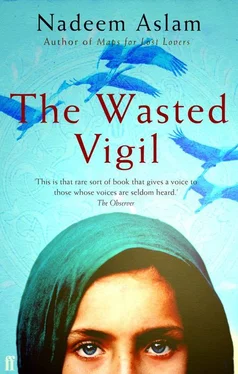Nadeem Aslam - The Wasted Vigil
Здесь есть возможность читать онлайн «Nadeem Aslam - The Wasted Vigil» весь текст электронной книги совершенно бесплатно (целиком полную версию без сокращений). В некоторых случаях можно слушать аудио, скачать через торрент в формате fb2 и присутствует краткое содержание. Год выпуска: 2009, Издательство: Faber and Faber, Жанр: Современная проза, на английском языке. Описание произведения, (предисловие) а так же отзывы посетителей доступны на портале библиотеки ЛибКат.
- Название:The Wasted Vigil
- Автор:
- Издательство:Faber and Faber
- Жанр:
- Год:2009
- ISBN:нет данных
- Рейтинг книги:4 / 5. Голосов: 1
-
Избранное:Добавить в избранное
- Отзывы:
-
Ваша оценка:
- 80
- 1
- 2
- 3
- 4
- 5
The Wasted Vigil: краткое содержание, описание и аннотация
Предлагаем к чтению аннотацию, описание, краткое содержание или предисловие (зависит от того, что написал сам автор книги «The Wasted Vigil»). Если вы не нашли необходимую информацию о книге — напишите в комментариях, мы постараемся отыскать её.
The Wasted Vigil — читать онлайн бесплатно полную книгу (весь текст) целиком
Ниже представлен текст книги, разбитый по страницам. Система сохранения места последней прочитанной страницы, позволяет с удобством читать онлайн бесплатно книгу «The Wasted Vigil», без необходимости каждый раз заново искать на чём Вы остановились. Поставьте закладку, и сможете в любой момент перейти на страницу, на которой закончили чтение.
Интервал:
Закладка:
‘She spent the night alone in the house,’ Marcus says quietly. ‘I should have gone back.’
‘I am sure she’s fine,’ David replies; he has nothing to base that on but he doesn’t know what else to say. He is in Jalalabad because he is financing a number of schools in the country. He has kept himself in the background, just letting a group of committed and intelligent local people get on with the details. Even the selecting of the name has been left to them and they want Tameer-e-Nau Afghanistan School. Building the New Afghanistan. The branch in this city became operational a fortnight ago, and he is here to see it, spending last night there, the dog in the building next door disturbing his sleep throughout. Before leaving the United States he tried to contact Marcus, and then again repeatedly on entering Afghanistan, but the satellite phone he had left him on one of his previous visits wouldn’t ring.
‘There is no electricity to recharge it,’ Marcus says in reply when he raises the subject now.
‘What about the generator?’
‘It seems too much to turn that on just for the phone.’
Present in his voice is the fear that he would not be understood, would appear contrary. So David touches his sleeve, ‘It’s all right. I worry about you. I won’t lie and say I don’t sometimes wish you would leave Afghanistan, but’ — he raises his hand — ‘I know, it’s your home, and if you weren’t here we would not have been able to learn about this young man.’
It’s minimal, his life, requiring adjustments on a weekly if not daily basis. Once David arrived from the USA to find a camel tied in the orchard for her milk. Once there was a ewe and a lamb. Some ducks, a stand of ripening corn. Items from the house are taken or sent to Kabul’s antique merchants sometimes. Most of the money David forces on him every year is, he’s sure, still around untouched, or has been given to others.
‘Can we see your school from here?’ His skin is dyed to fawn after the decades of strong sunlight and heat, making him look almost like a native of this country, maybe someone from the Nuristan province.
‘Yes. It’s not far from here. Just follow that curved street, then along that road — see those palm trees? It’s the yellow building just beyond them, next to the big white one.’
‘I see it. So great is the love of a male palm tree for the female palm tree, that it always grows leaning at an angle towards it, even if it is in a neighbouring garden. Did you know?’
The city centre down there is full of citrus trees, this valley being famous for its orange blossom, verse makers from across Afghanistan gathering in Jalalabad in mid-April every year for a Poets’ Conference to recite poems dedicated to the blossom.
David rubs his face with his large hands. ‘We have a view of all sides from here, like the Pentagon in Washington, DC.’
‘And the wooden O of Shakespeare’s Globe Theatre.’
They stare at the mountain range, the blue and white ridges. The air can be very thin on some of those heights. The US Army has discovered that at times the blades of its helicopters cannot find enough purchase to get airborne from there, the machines swaying a few feet off the ground.
Even the air of this country has a story to tell about warfare. It is possible here to lift a piece of bread from a plate and, following it back to its origins, collect a dozen stories concerning war — how it affected the hand that pulled it out of the oven, the hand that kneaded the dough, how war impinged upon the field where the wheat was grown.
PARTICIPATING IN some battle when he was about ten years old, Bihzad had seen a fire break out in the long dried grasses of the meadow where the dead and the dying lay. He remembers feeling ashamed because his pangs of hunger had increased with the smell of roasting meat.
He now opens his eyes onto opium flowers. He moves along the edge of the field, the white-streaked pink blossoms swaying in the late-morning breeze. From Jalalabad up until a moment earlier, he was blindfolded. The man who had uncovered his eyes is now guiding him towards a building beyond the expanse of poppies.
He has been brought here before. It was three days earlier, another journey with the sense of sight disabled. Now too he is delivered from person to person inside the building. At one door there is a coded set of knocks. Three times, pause, twice, then a final twice. It’s been changed since the previous occasion, he notices.
‘So you are clear on all the details?’ says the man who leads him down a dark staircase. ‘You are to drive the truck out of here and park it outside the new school, between the tree with the red flowers and the large signboard that shows the public how to recognise different landmines.’
Bihzad has not been introduced to anyone by name here but, during an unexpected moment of tenderness during the previous visit, he had felt emboldened enough to ask this man if his name was indeed Casa, having overheard one of the others refer to him as that. The man had agreed with a quick almost-soundless ‘Yes’, and then gently grabbed Bihzad’s collar, telling him he mustn’t try to be too clever. Everyone else he has encountered here is dour and tense, exuding unrelenting distrust and hostility.
Now Casa tells him, firmly, ‘Do not deviate from your instructions in any way.’
They enter a room below ground where on a shelf, lit by a small bulb from above, there are two square frames containing the calligraphed names of Allah and Muhammad, peace be upon him. Between them, in a glass box, is a mounted mongoose with its teeth sunk into the edge of a cobra’s hood, the serpent’s black length wrapped three times around the body of its adversary. A figure sits cross-legged on a bed in the dimly lit other side of the room. The Kalashnikov in his lap has a second magazine taped to the first. Casa deferentially presents Bihzad to him and takes a few steps back.
His power and authority within this group is obvious, and he addresses Bihzad in measured tones: ‘You have been shown what to do? You’ll press the button attached to the red wires and get out of the truck and walk away.’
‘It won’t go off while the children are still inside the school, will it?’
‘Do not doubt our word,’ the man says quietly but with an edge to the voice. Earlier Casa had said Bihzad was being given the honour of doing this for Islam and for Afghanistan. ‘Aren’t you troubled that boys are being brainwashed in there,’ Casa asks now, ‘and girls taught to be immodest?’
The man raises a hand towards Casa. A thin blanket is draped on his shoulders, open in the middle as though to expose his pure transparent heart. He must have been writing something earlier because there is ink on his fingers. ‘We have no remote controls, and the timers we have are not very sophisticated either. Otherwise we wouldn’t have had to involve you, would have just left the truck outside that school built and owned by Americans. Someone has to park the vehicle and set the timer going on site. The explosion will happen hours later. You must know that Allah and the prophet Muhammad, peace be upon him, will be greatly happy with you.’
Bihzad has been told how this operation is just the beginning, a demonstration to attract and obtain help for bigger things. The man in this basement room, once a great fêted warrior, cannot return to his native village, a place Bihzad has overheard being referred to as Usha. An enemy has appropriated power there, having accepted money and weapons from the Americans at the end of 2001 to help uproot the Taliban and al-Qaeda. But soon this enemy — these men called him a traitor to Islam and Afghanistan — would be made to regret everything, happy though he is for the time being because he has been given a place in the government of the province. A large-scale raid is being planned for Usha, a spectacular offensive to drive out that unbeliever and his American-paid fighters and bodyguards. There will be a war.
Читать дальшеИнтервал:
Закладка:
Похожие книги на «The Wasted Vigil»
Представляем Вашему вниманию похожие книги на «The Wasted Vigil» списком для выбора. Мы отобрали схожую по названию и смыслу литературу в надежде предоставить читателям больше вариантов отыскать новые, интересные, ещё непрочитанные произведения.
Обсуждение, отзывы о книге «The Wasted Vigil» и просто собственные мнения читателей. Оставьте ваши комментарии, напишите, что Вы думаете о произведении, его смысле или главных героях. Укажите что конкретно понравилось, а что нет, и почему Вы так считаете.












